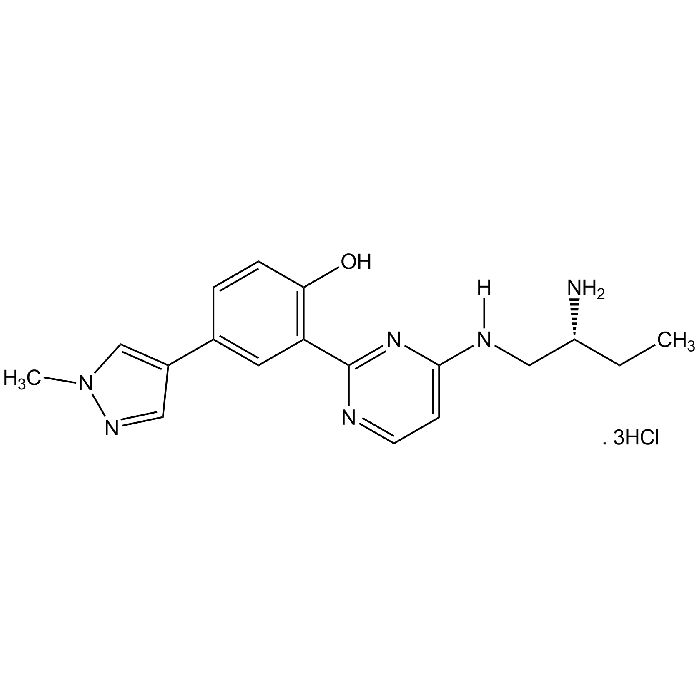Cookie Policy: This site uses cookies to improve your experience. You can find out more about our use of cookies in our Privacy Policy. By continuing to browse this site you agree to our use of cookies.
AdipoGen Life Sciences
CRT0066101 . HCl
As low as
50
CHF
CHF 50.00
In stock
Only %1 left
AG-CR1-3550-M0011 mgCHF 50.00

| Product Details | |
|---|---|
| Synonyms | 2-[4-[[(2R)-2-Aminobutyl]amino]-2-pyrimidinyl]-4-(1-methyl-1H-pyrazol-4-yl)-phenol . hydrochloride |
| Product Type | Chemical |
| Properties | |
| Formula |
C18H22N6O . 3HCl |
| MW | 338.4 . 109.4 |
| CAS | 1781742-22-0 |
| Purity Chemicals | ≥98% |
| Appearance | White to off-white solid. |
| Solubility | Soluble in water (10mg/ml) or DMSO (3mg/ml). |
| InChi Key | HWZPJKPBOZVLEB-XJCLVHIMSA-N |
| Smiles | N[C@@H](CN([H])C1=CC=NC(C2=C(C=CC(C3=CN(N=C3)C)=C2)O)=N1)CC.Cl.Cl.Cl |
| Shipping and Handling | |
| Shipping | AMBIENT |
| Short Term Storage | +4°C |
| Long Term Storage | -20°C |
| Handling Advice | Protect from light when in solution. |
| Use/Stability | Stable for at least 2 years after receipt when stored at -20°C. |
| Documents | |
| MSDS |
 Download PDF Download PDF |
| Product Specification Sheet | |
| Datasheet |
 Download PDF Download PDF |
Description
- CRT0066101 is an inhibitor of all three PKD isoforms (IC50s = 1, 2.5, and 2 nM for PKD1, PKD2 and PKD3, respectively). It exhibits selectivity for PKD against a panel of >90 protein kinases, including PKCα, PKBα, MEK, ERK, c-Raf, c-Src and c-Abl.
- PKD family members play an important role in regulating several cellular processes and activities, including chromatin organization, Golgi function, gene expression, cell survival, adhesion, motility, differentiation, DNA synthesis and proliferation.
- CRT0066101 shows anticancer activity by blocking cell proliferation, inducing apoptosis, G2/M phase arrest, inhibiting migration and invasion and reducing the viability of several cancer cells both in vitro and in vivo.
- CRT0066101 reduced PKD-dependent NF-κB activation and NF-κB-dependent gene expressions in pancreatic cancer cells in vitro and showed antiviral activities inhibiting viral RNA replication and viral protein expression.
- Protein kinase D (PKD) has emerged as an important NLRP3 kinase that catalyzes the release of a phosphorylated NLRP3 species that is competent for inflammasome complex assembly. PKD inhibitor CRT0066101 could block NLRP3 inflammasome assembly and interleukin-1β production.
- CRT0066101 also inhibits MyD88 and TLR4 expression and reduces NF-κB, ERK and JNK phosphorylation, indicating that it exerts anti-inflammatory effects on LPS-induced inflammation through the TLR4/MyD88 signaling pathway.
Product References
- A novel small-molecule inhibitor of protein kinase D blocks pancreatic cancer growth in vitro and in vivo: K.B. Harikumar, et al.; Mol. Cancer Ther. 9, 1136 (2010)
- Protein kinase D1 promotes anchorage-independent growth, invasion, and angiogenesis by human pancreatic cancer cells: N. Ochi, et al.; J. Cell Physiol. 226, 1074 (2011)
- Protein kinase d regulates cell death pathways in experimental pancreatitis: J. Yuan, et al.; Front. Physiol. 3, 60 (2012)
- Protein kinase d as a potential chemotherapeutic target for colorectal cancer: N. Wei, et al.; Mol. Cancer Ther. 13, 1130 (2014)
- Effective Targeting of Estrogen Receptor-Negative Breast Cancers with the Protein Kinase D Inhibitor CRT0066101: S. Borges, et al.; Mol. Cancer Ther. 14, 1306 (2015)
- Novel Small Molecule Inhibitors of Protein Kinase D Suppress NF-kappaB Activation and Attenuate the Severity of Rat Cerulein Pancreatitis: J. Yuan, et al.; Front. Physiol. 8, 1014 (2017)
- Investigation of the Role of Protein Kinase D in Human Rhinovirus Replication: A. Guedan, et al.; J. Virol. 91, e00217 (2017)
- Protein kinase D at the Golgi controls NLRP3 inflammasome activation: Z. Zhang, et al.; J. Exp. Med. 214, 2671 (2017)
- Developments in the Discovery and Design of Protein Kinase D Inhibitors: P. Gilles, et al.; ChemMedChem 16, 2158 (2021) (Review)
- Evaluation of protein kinase D auto-phosphorylation as biomarker for NLRP3 inflammasome activation: D. Heiser, et al.; PLoS One 16, e0248668 (2021)
- Small molecule inhibitor CRT0066101 inhibits cytokine storm syndrome in a mouse model of lung injury: B. Cui, et al.; Int. Immunopharmacol. 120, 110240 (2023)





